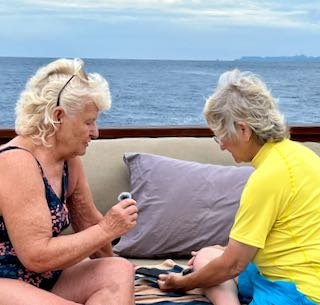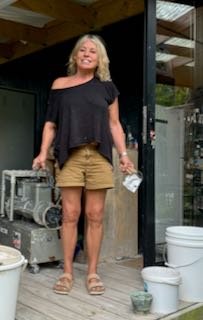“What are your personal experiences that have convinced you that climate change is real?”
Hi, my name is Graham Tratt. I'm 80 years old. I come from Sydney, Australia. I've traveled around the world quite a bit and I guess the most obvious sign of climate change I've seen is that the glaciers are retreating everywhere in South America and North America. I think everywhere there are glaciers, they're retreating. In New Zealand, they're retreating. We don't have any glaciers in Australia, so they can't retreat. Other things are changes in water temperatures in the sea. It's getting warmer, which is causing massive bleaching of our barrier reef. I think last year when they did a study, 80% of the reef had been bleached, which left 20%. If that continues, the barrier reef will disappear. Also, at the moment, I'm in Indonesian waters and there are significant signs of dead coral everywhere. There's still lots of live coral, but in places there's large extensive bleached coral. Other signs of climate change are because the oceans are warming, which means that fish that would be in one region have now moved to another region, which is at a temperature that is more suitable for them. This has happened in Tasmania where kelp forests have been destroyed by species that normally don't travel that far south because it's too cold, but now it's got warmer. Climate changed, due to carbon dioxide emission, there's been evidence. When I was at uni in the 60s. You only had to read scientific American to see how the CO2 levels were increasing and they've increased very much more since then. And back then, not many people knew about that, but it was obvious that with CO2 increasing the earth's temperature was going to increase and it has. Last year, I think, was the hottest year on record and the year before that was the second hottest year on record. We now have the situation with bushfires in the US in February. California had massive bushfires. That's their winter. Normally Australia would get charter, firefighting, water bombing aircraft from United States to use in our summer. But now that's becoming less tenable because they are needed virtually all year round in the US. In Australia, we still don't get bushfires in wintertime, but the bushfire season has grown, so it's a longer part of the summer.
(Please note: Because of Tommy’s learned english from mostly movies, I have made changes to sentence structure so that as you read, his thoughts flow unincumbered.)
Hello my name is Tommy Harivaldo. I'm from Borneo, Indonesia. I'm 25 years old and live in Jakarta. Jakarta is the capital city of Indonesia. I do feel the impact of the climate change and the sea level rising, especially in Jakarta. I live close to the coast in the city and usually when it's rainy season in Indonesia, a big storm, it will be flooded everywhere. Even the government wall to prevent the ocean reaching to the population, the wall they build is already almost half filled. So it doesn't really look good.
Also in climate change, I am working in tourism and travel a lot in my country. I go to Flores, Raja Ampat, Bali, Sulawesi. So I do a lot of snorkeling and diving. The first thing I notice is the coral reef changing. Whereas two years ago, one year ago, the coral reef in Raja Ampat was super beautiful, super vibrant. The color super pops, and right now, this year, 2025, there's a lot of changing. Lots of corals start to die because of the warmer temperature in the sea. And lots of stressing corals, start them dying. Especially in Bali. I used to work in Nusa Penida . I noticed in just less than a month, the coral reef in Nusa Penida is dying. It's death. It's not dying, but it's death. In less than a month. All the algaes from the corals are dead, and it's turned to black color. So there's no color on it.
The other things I notice, is the weather is changing. Usually in the December, in Bali, it's bad weather, super super bad. We got a strong wind and lots of heavy rain and usually it's a choppy water. But this last two years, it's changing. The bad weather happens in December, but now it's happened in January and even in February. And the weather comes a bit hard to predict. So it's very bad. Thank you.
My name is Carla. I live in Barcelona, Spain, and I am 35 years old.
We are cruising Raja Ampat. It's been one of my dreams since 10 years ago. It's gorgeous, but I remember when we were cruising towards Raja Ampat, seeing a big, big, big stream of trash, something that I've never experienced before. It was very sad to me to see that. And also these days, when we started snorkeling - we are very fortunate to be here and we're seeing spectacular corals and animals and wildlife - but one of the first things I realized is that there's plastic almost everywhere and that plastic, it's not something that nature is bringing there. It's plastic coming from things that humans use. I mean, water bottles, every other plastic you can imagine, but everything is coming from us. And then I also remember we were doing one of our first snorkels and we saw a very vibrant yellow coral, and we were amazed by that. But then Tommy, our guide, explained later that that's one of the signs that the coral is dying because of the water temperature rising. And it was also very sad. And now after that many snorkels, everything beautiful, but I can realize which corals are about to die because they are becoming more white and which corals are okay, and which coral are completely dead. Even though I feel super fortunate and grateful to be here and experiencing this beauty, I'm also realizing how climate change is affecting nature and how sad that is. It's a bit frustrating because I don't really know how to begin to change that. But for sure I'm bringing some changes back to my life once I'm back in Barcelona.
Sandra speaking on Climate Change:
(from Voice Memos-02-11-2025)
On board the Bugges in Raja Ampat, Indonesia
I'm Sandra Trant and I am 68 years old and I live in Devon, England. The thing I've noticed probably most of all is the change in the weather. For us, we have now had so many storms. Storms were irregular. We name every storm alphabetically. By the time January had come, we'd already got up to, I think H. So in that time, you know, we'd had a lot of storms and the ferocity of them is great. The other day, just before we left to come here, we had winds in some parts of the country, up to 100 miles an hour. Well, we don't have that normally. I mean, I can't remember when we've had that. And down in the southwest where it's very, very mild - we're very near the Scilly Isles - that's where they grow all the daffodils very early. And we've just noticed that the storms are hitting there where they never used to before. The weather has just gone berserk, really. I mean, in December, we could have sat out in the garden, you know, all by be it with a barbecue or something or a little log fire or something. But I mean, to sit out in the garden in December in England is not a done thing. We had daffodils coming out before December. I had things like honeysuckle and roses in the garden in December, which are obviously not meant to be there. Normally you don't see daffodils until at least March, roses towards the summer. So the flowers have all gone really berserque as well. We've cut the the shrubs back and things like that, and they're budding, which they shouldn't be doing. So mainly for me, it's been the weather that I've noticed the big change. The thing that upsets me most is the plastic. Going down onto our beaches, there's a lot of plastic there. But when I think about coming here (Raja Ampat, Indonesia), coming to these beautiful places, then it's really upsetting because this is the most pristine place. You go underneath the water and you see plastic bottles. We all saw that today, didn't we? Most pristine area and plastic bottles on the beach. And yeah, that's what most upsets me. I used to work in a school. I've been invited back to go back any time I like. And when I go back, I'm going to go and talk to them about it and I'm going to do it again because we touch on it. But I'm going to try and drive at home to them, you know, just how how bad it is. And also about the coral because I'm shocked that coming out this far. I expect it to be pristine coral and it isn't. A lot of it is dying and you know, break your heart, doesn't it really? So that's what I'm going to do when I get back.
Franz on Climate Change
(from Voice Memos-02-11-2025)
On board the Buges in Raja Ampat, Indonesia
Hello, I'm Franz from Barcelona. I'm 35 years old. A few ideas go to mind. The first one is, I'm now traveling the world with Carla and we are seeing a few of the most beautiful places, otherwise that we have seen, and it's quite sad to see sometimes the pollution, trash and plastic that we find on these places. This was the first idea. Second idea is, I think, because of climate change. I'm realizing or I have the feeling that more natural catastrophes are happening recently in Spain, we had flooding in Valencia and hundreds of people died. So big things like that also help you realize of how the issue will definitely impact our lives. I’m more concerned I have around that its that well the difficulty of what we can do as individuals, because when you look at the statistics around that, most of the damage is happening by big industries. And particularly I'm from Europe and when I look at statistics, it's usually Europe that is not leading, right? So sometimes it's what we can do as individual. It seems difficult that we can really affect or improve this, if there is not an improvement around the world. I want to say one more thing. I'm 35 I would like to have kids and even I definitely am seeing impacts. I think that the ones that will be more impacted are future generations. So I want to have kids and I would like them to not see the full impact that could happen if things don't change.
Chris on Climate Change
(from Voice Memos-02-11-2025)
On board the Buges in Raja Ampat, Indonesia
My name is Chris, age 71. I live in southwest England. These are my personal thoughts about climate change and global warming and how it affects me. Southwest England or England isn't really affected by rising water levels at the moment. Potentially, if water levels rise significantly in the future, then we're all in big trouble. But what I've found is, for instance, when we left the UK at the end of January, we had four named storms. A named storm is a significantly stronger storm than normal. Four in ten days is rare, bizarre. The cause, the Atlantic Ocean, heats up, the jet stream sweeps them in, the UK is being battered, has been battered now for for years. Once in 50 years, once in a hundred years storms, and now once every five years, once every ten years. It has to be because there's too much heat in the ocean. It's the earth's way of trying to get rid of all this energy. It's causing the UK massive problems in flooding. Various parts of the UK are being flooded regularly, especially in the autumn and in the winter. Our seasons now, the summers are getting drier. The autumns are getting really wet. We may possibly have a bit of ice and snow in the winter, but not as much as normal. My second personal ideas about global warming and ocean temperatures rising - I do a bit of recreational fishing, and we are now seeing tuna, yellow fin tuna off the southwest of England, big 200 to 300 kilo yellow fin tuna. Twenty years ago, you'd have been laughed at out of the room, thought you absolutely mad. Now virtually every time we go out fishing, we see signs of their activity. You don't necessarily see them, but you see the small baitfish scattering in all directions. The other thing that we've found is white egrets. There are two forms of egret, the lesser and the greater white egret. Now they are European, but they, for about the last 20 years, they're now resident in the UK, especially the southwest. They breed, again, 20, 30, 40 years ago, unheard of. Lastly, last summer, I caught an octopus, caught an octopus fishing off Cornwall. I mean, how crazy is that?
Lauren Young from Waiheke, New Zealand
January 29, 2025
Topic: “Unity”
I would actually like to see everybody joined up in whatever it takes to save our lovely planet. I think you know we're working in silos and people are being expedient and thinking in the short term. But now, you know, we've actually reached a tipping point and I think people are going, when I said people, politicians actually, and anyone who is able to make decisions that are going to be good for their grandchildren, that is what is important because you know we’re 98 seconds in the doomsday clock. It's actually time for action and not to think about lining your own pockets and protecting an economy that is not working or not sustainable, that's really, really important. So join together.
NOTE: We were having issues with the recording, hence there are two transcripts.
I would like to see everybody joined up in thinking in the same way, which is to save our world. I've actually gotten to the point where I can't read any more about global warming, climate change, etc, because I just so despair. We may look a little bit different, but we have a self, and we actually care about our grandchildren, and there's so much that's happening that is so destructive for our grandchildren. And I just think, let's join up on this, because we can actually make a difference. If we do, we can change stuff, you know. And I realize that so many things are now at a tipping point. They really are, you know, there's some things that are already irrevocable. That is my heart.







